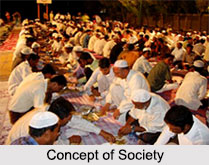 Concept of Society in Islam rests on the brotherhood of the religion, and it tries to unite its followers. The belief is that God is so great that all men are equal before him. However, social divisions do exist.
Concept of Society in Islam rests on the brotherhood of the religion, and it tries to unite its followers. The belief is that God is so great that all men are equal before him. However, social divisions do exist.
Rules in Islamic Society
There are said to be four cardinal virtues according to Islam and the right conduct is the golden mean. In order to run the society in an appropriate way certain rules are required to be followed by every adherent of Islam irrespective of the fact which caste or class he belongs. It is the duty of every Muslim to do his share in maintaining public order; in the words of the Holy Quran he must ``command what is right and forbid what is wrong``. Respect for the aged and parents should become like a second nature. Among the virtues which are highly valued in Islamic society is the ability to keep a secret.
Decorum is important and must be adhered to by a Musalman. A man should be dressed suitably to his rank and the occasion. Eating in public places is reprobated. This is in part due to fear of the evil eye and in part to religious scruple for a man should not be seen eating what others cannot afford to buy. All intoxicants are forbidden.
Sin in Islamic Society
According to this religious discipline, amongst the gravest sins that a man can commit, murder is the greatest sin of all. Others are unlawful sexual relations, sodomy, wine bibbing, theft and forcible appropriation of the property of others, slandering honest women, scandal-mongering, false witness, swearing falsely, failure to do one"s duty to one"s family or tribe, deserting from the army in the holy war, mismanaging the estate of an orphan, being too early or too late with prayer, telling lies about the Prophet Muhammad, striking a Muslim without due cause, concealing testimony, bribery to deflect the course of justice, serving as pimp or pander, refusal to pay the legal alms, despairing of God"s mercy, trust in one"s cunning and God"s pardon of one"s sin, violation of Zihar - a formula of divorce which makes subsequent re-marriage equivalent to incest, eating pork or carrion, not fasting in Ramadan, cheating, brigandage, sorcery and usury, and persistence in venial sin.
Hence, the above mentioned are some of the principles that Islam has laid down so that order prevails in the society.




















